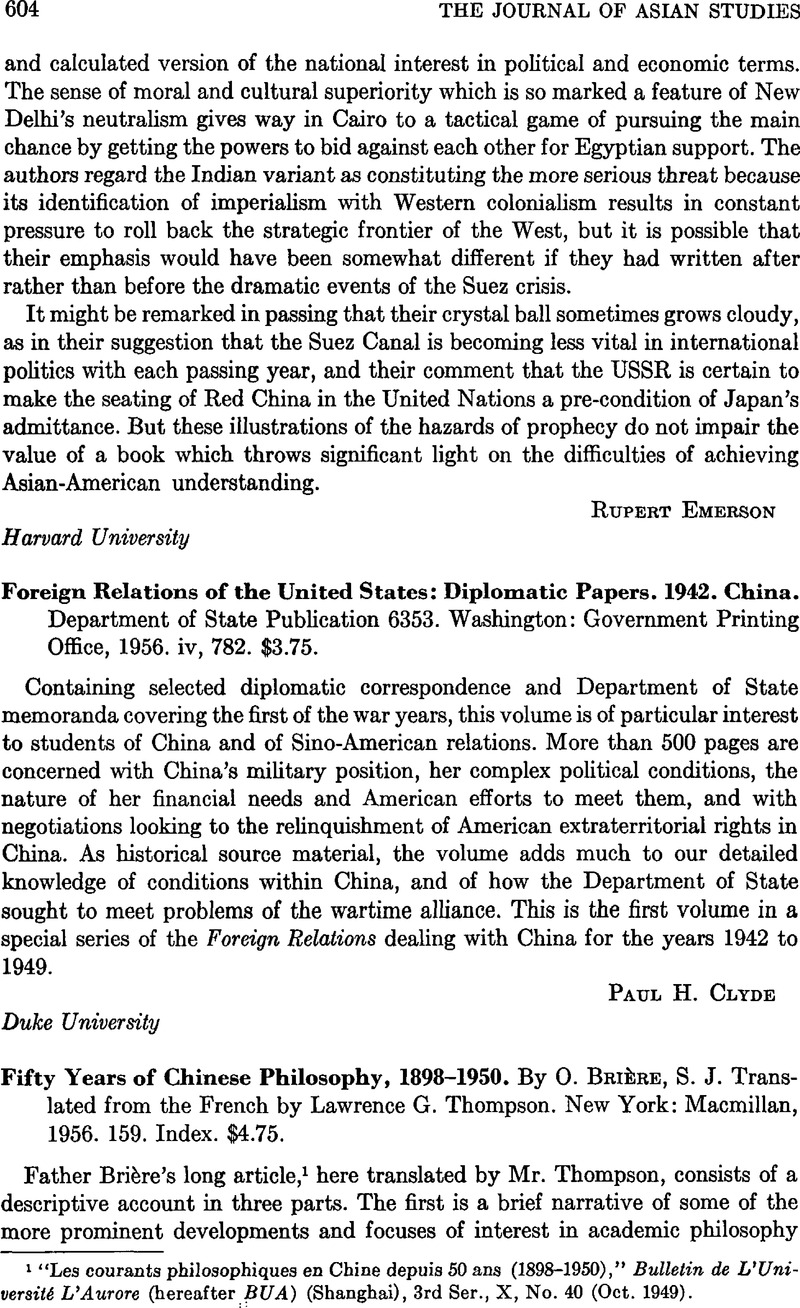No CrossRef data available.
Article contents
Fifty Years of Chinese Philosophy, 1898–1950. By O. Brière S. J. Translated from the French by Lawrence G. Thompson. New York: Macmillan, 1956. 159. Index. $4.75.
Published online by Cambridge University Press: 23 March 2011
Abstract

- Type
- Book Reviews
- Information
- Copyright
- Copyright © The Association for Asian Studies, Inc. 1957
References
1 “Lies courants philoaophiques en Chine depuis 50 ans (1898–1950),” Bulletin de L'Université L'Aurore (hereafter BUA) (Shanghai), 3rd Ser., X, No. 40 (Oct. 1949).Google Scholar
2 “Les tendences dominantes de la littérature chinoise contemporaine,” BUA, IX, No. 35 (July 1948), 236.Google Scholar
3 A third, “L'effort de la philosophie marxiste en Chine,” BUA, VIII, No. 31 (1947), 309–347Google Scholar, while containing some new data, repeats much of the material on Marxism in the present volume.
4 E.g., Liu Shao-ch‘i is nowhere mentioned. Such a book as How to Be a Good Communist would perhaps not have been recognized by Brière as “philosophy”; yet it, and its kind of writing, played much the same role in Communism as the philosophy of “knowlege” and “action” was intended to play in the Nationalist movement, namely, that of inducing wholehearted acceptance of political authority in the citizen by getting him to turn his critical attention from the state and its leaders to himself.
5 E.g., four translations of works by Bertrand Russell are listed. At the time of this writing, the Hoover Library at Stanford had, among its Russelliana, seven items which were available when Brifère wrote but are not in his list, including two issues of a journal devoted to Russell, Lo-su yüeh-k‘an, which appeared in 1921.
6 Dr. Hu Shih is mentioned in connection with this journal, although as far as I can discover he did not contribute to it; Chin Yüeh-lin is not mentioned as having participated, although he was an almost constant contributor from the start. Kao Ming-k‘ai, who has been publishing more recently in linguistics, contributed frequently and interestingly, but is mentioned nowhere by Brière.
7 Wu wrote no books (though his articles have been collected in book form); and as he was not a philosopher of the academic sort but “basically a journalist and politician” (Forke, , Geschichte der neueren chinesischen Philosophie, Hamburg, 1938, p. 636Google Scholar) one will not find him in Che-hsüeh p‘ing-lun.
8 Of Chin's Lo-chi [Logic] (1935) Brière writes (p. 134), “The book is nothing but a mass of algebraic formulas”—and then adds, “but the thought is logically sound.” One is puzzled to understand how anyone making the first comment could feel qualified to make the second.
9 Some few translations of Chinese titles seem wrong—e.g., Fung Yu-lan's Hsin chih yen is not “New Wisdom” (p. 100, 113); chih yen is not “wise words” or “words of wisdom” here, but “understanding of words” (cf. Mencius 2A2). (In fact, the book is Fung's appraisal of the whole tradition of language analysis as a philosophical method.) But in such cases Briere's own translations are apt to be less satisfactory. I assume Mr. Thompson did not prepare his own index, and that it is not he who has discovered a philosopher named “David Locke” (p. 158).




